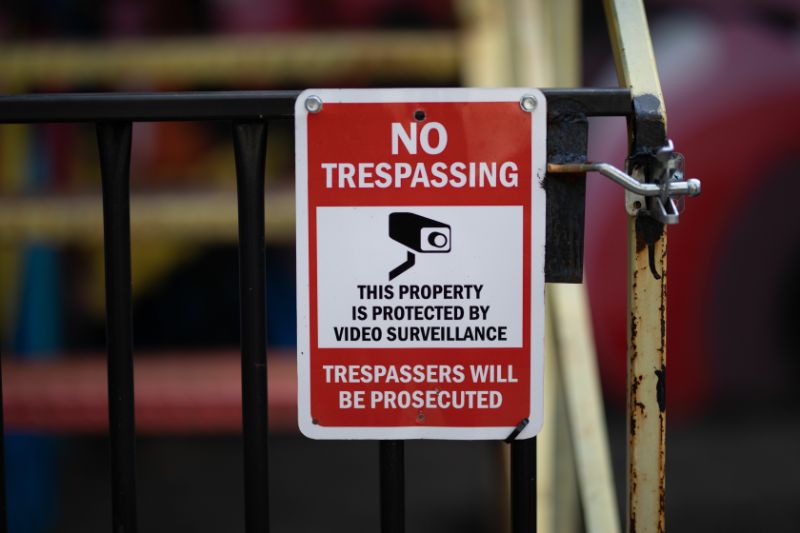
Are you or a loved one facing criminal trespass charges in Northern Arizona? Understanding the charges and how a criminal defense lawyer can help is crucial. This guide will provide an overview of Arizona trespassing laws, the different types of criminal trespass, and the potential penalties involved.
What is Criminal Trespassing?
Criminal trespassing in Arizona occurs when an individual knowingly enters or remains unlawfully on someone else’s property without permission. Under the Arizona Revised Statutes (A.R.S.), there are three degrees of criminal trespassing, each with varying degrees of severity and penalties:
Third Degree Criminal Trespass
Per A.R.S. 13-1502, third-degree criminal trespass occurs when an individual knowingly enters or remains unlawfully on any real property after being asked to leave by the property owner, law enforcement, or anyone with lawful control over the property. It also applies if the property has posted signs prohibiting entry. This offense is considered a class 3 misdemeanor, the least severe trespassing charge that can result in legal consequences.
Second Degree Criminal Trespass
Second-degree criminal trespass, defined under A.R.S. 13-1503, involves knowingly entering or remaining unlawfully in or on any nonresidential (commercial) structure or within a fenced commercial yard. This offense is classified as a class 2 misdemeanor, which carries lesser penalties than first-degree trespassing but still involves criminal charges.
First Degree Criminal Trespass
According to A.R.S. 13-1504, first-degree criminal trespass occurs when a person knowingly enters or remains unlawfully in or on any of the following:
- A residential structure or fenced residential yard.
- Property with a valid mineral claim with the intent to hold, work, or take the claim.
- A critical public service facility.
- The property of another person with the intent to damage or commit theft.
First-degree criminal trespass also includes entering a residential yard and infringing on the privacy of its inhabitants, commonly known as “voyeurism” or being a “peeping Tom.” This offense is typically classified as a class 1 misdemeanor. However, if more serious intent or damage is involved, it can escalate to a class 5 felony. If the trespasser is under 18, the charge may be treated as juvenile trespassing, usually a class 1 misdemeanor in Arizona.
What is Civil Trespassing?
Civil trespassing does not constitute a separate type of trespassing but refers to a civil action that the property owner may file against the trespasser. Under Arizona law, a property owner can bring a civil case against the trespasser for any damages incurred to the property. This is distinct from criminal charges and typically involves seeking monetary compensation for damages rather than criminal penalties.
Criminal Trespassing Consequences in Arizona
The penalties for criminal trespassing in Arizona vary depending on the degree of the offense.
Possible Penalties for Third Degree Criminal Trespassing:
A class 3 misdemeanor is punishable by up to 30 days in jail, a fine of up to $500, and probation.
Possible Penalties for Second Degree Criminal Trespassing:
A class 2 misdemeanor can lead to up to four months in jail, fines up to $750, and probation.
Possible Penalties for First Degree Criminal Trespassing:
A class 1 misdemeanor can result in up to six months in jail, a fine of up to $2,500, and probation.
If classified as a class 5 felony, penalties may include up to 2.5 years in prison, higher fines, and extended probation.
FAQs About Trespassing in Arizona
Don’t see your question answered here? Reach out directly and ask an attorney!
Can You Shoot a Trespasser in Arizona?
Arizona law permits the use of deadly force against a trespasser only under specific circumstances, such as imminent danger or serious physical harm.
Review our blog on which self-defense weapons are legal in Arizona.
Is Trespassing a Felony in Arizona?
Trespassing can be classified as a felony if it involves first-degree trespass with specific aggravating factors, such as intent to commit theft or damage to a critical facility.
Can You Trespass on Public Property?
Yes, trespassing charges can still apply on public property if there are restrictions or prohibitions in place, such as restricted government areas or facilities.
Can Trespassing Charges be Dropped?
Yes, depending on the circumstances of the case, a skilled criminal defense lawyer may be able to negotiate to have trespassing charges reduced or dropped entirely.
How a Criminal Defense Lawyer in Flagstaff Can Help
A lawyer specializing in criminal defense can help you understand the nuances of your case, including whether your actions truly constitute criminal trespassing. They can:
- Investigate Your Case: Gather evidence and witnesses to challenge the charges.
- Conduct Jury Selection: Help ensure a fair and impartial jury if your case goes to trial.
- Represent You in Court: Provide professional representation to argue on your behalf.
- Assist With Plea Bargaining & Sentencing: Negotiate plea deals and work towards reduced sentences or dismissal.
Schedule a Free Consultation on Your Assault Case
It’s important to act quickly when facing a criminal trespassing charge. Contact a criminal defense attorney in Flagstaff to discuss your case, explore your options, and determine the best course of action. At Antol & Sherman, we are dedicated to defending your rights and helping you navigate the complexities of Arizona trespassing laws. Schedule your free consultation today!



